QuestionMy ferret is named Scooter and she was given to us by a mutal friend about 2 years ago. I am not exactly sure how old she is but I was told she was around a year when she was given to us. She has been an absolutely delightful pet!!! About 2 months ago she started losing her hair. At first it was just a few spots on her back. I thought I may be bathing her too often. I only bathed her once a month in shampoo from the pet store for ferrets. i did use a spray on her in between bathes. But since she started losing hair i immedettly stoped using it and even giving her a bath. I clean her poop out of her cage daily and deep clean her cage weekly. She does have free run of the house but nothing has changed. We have not used anything new on the carpets or detergent on the furniture. Her diet has also been the same except when she starting losing her hair I purchased some treats to help with her coat and some oil to mix in with her food. I feed her Super Premium Ferret blend with Taurine by wild Harvest and the oil is by Ferretone and is called for Skin and coat supplement. The bedding I use in her cage is Care Fresh Pet Bedding it is a gray/brown color. She has now lost almost all the hair on her back and and tail except for a small patch on the bottom of her tail. She hasn't lost any hair on her belly. Her activity level is the same and plays with us often. Her appitate is also the same. I have noticed that she is smaller in size then the ferrets I see in pet stores. Please help me!!! My chidren and I love her and the thought of losing her is too much to bear!! My children are 21 years old, 14 years old and 11 years old. You may reach me by e-mail or by phone. My home number is 843-576-4138 I would be more then happy to call you. Please< any help would be greatly appreciated!!!
Sincerly,
Stephanie Russell
AnswerHi Stephanie:
It sounds like your little ferret is very very loved! When ferrets reach 'middle age', which your ferret is, they often begin to lose fur and can also have a variety of other symptoms, which for a female ferret could also include swelling of the vulva. The symptoms are caused by an excess of hormones secreted by adrenal glands that have developed tumors on them. This is probably the most common illness we see in ferrets here in the United States. There is currently research ongoing which points to early neutering as the culprit of triggering *something* in the hormonal system to go haywire and ultimately show itself in adrenal tumors. In the UK they don't neuter their ferrets and adrenal disease is unheard of! Of course, other problems come with not neutering, but hopefully they can figure out a solution that is more acceptable than such early neutering that is shortening our baby's lives so drastically.
There IS a definite cure for adrenal tumors - surgery. Surgery to remove the tumors is very very common and almost all vets who see ferrets have experience in removing these tumors because it is such a common disease in ferrets. Generally the tumors are on the left adrenal gland, which is no real problem, but occasionally they are on the right adrenal gland also, which *can* be a problem because the vena cava runs right alongside the gland. The vena cava is, as you probably know, the largest artery in the body, so there is some chance of the slightest little knick on that artery and the ferret can bleed to death in seconds. Because we never know what is going to happen in surgery, it's important to plan ahead for the worst and make sure you are sending her to surgery with a vet you trust and someone you know has lots of experience with ferrets and ferret surgery.
In case you don't already have a ferret vet, here are some lists of ferret vets compiled by other people from various sources online. If you DO have a vet, now is the time to ask the hard questions "How many RIGHT-SIDED Adrenal surgeries have you done SUCCESSFULLY?" (i.e. meaning the ferret lived at least a week afterwards). Hopefully one or more of these sites will have a vet(s) listed within driving distance to you. Also, please consider that the cost of adrenal surgery is *usually* between $200 to $1,000, and often the vet with more experience is the cheaper (not always tho), so it always pays to call around and ask how much a straight forward, no complications adrenal surgery costs. Make sure you are comparing "apples to apples", so describe it exactly the same when you call each vet office. Once you narrow it down to just a few vets, then is time to start asking "how many adrenal surgeries did this vet do on ferrets in 2007?" and "How many of those ferrets died either in surgery or within a week after surgery?" That will tell you a lot right there. Hopefully it will help you choose wisely. There is no reason for surgery to be any scarier than it already is - we just need to ask the right questions beforehand so you can rest when her surgery day comes. Here are the lists:
VETS CANADA:
* http://www.ferretrescue.ca/start.php
* http://tinylink.com/?TlVyYKa6e0
* http://www.ferrets.org/Veterinarian_Listings.htm
* http://www.ferretcentral.org/for-others/db-vets.html
* http://pets.groups.yahoo.com/group/sask_ferrets/
VETS USA:
* http://www.quincyweb.net/quincy/vet.html
* http://ferrethealth.org/vets/
* http://www.ferret-universe.com/vets/vetlist.asp
* http://www.ferretsanctuary.com/vets.shtml
* http://www.ferretcentral.org/for-others/db-vets.html
* http://ferrethealth.org/vets/
VETS UK & IRELAND:
* http://homepage.ntlworld.com/ferreter/vetlist.htm
VET INFO/ LIST OF FERRET GROUPS/ CONTACTS IN UK, ITALY, NEW ZEALAND, AUSTRALIA, NETHERLANDS, GERMANY & DENMARK:
* http://www.ferretcentral.org/for-others/db-overseas.html
There is an injectable medication you will read about whenever you start reading about adrenal disease that is called "Lupron" (leuprolide acetate) which actually affects the hormone level and *masks* the symptoms of adrenal disease. It does NOT, however, stop the tumor(s) from growing and/or becoming metastatic, spreading to other organs. Since your ferret most likely still has many years of life ahead, I would think that surgery - as soon as possible - would be the best option.
A recent example you may find interesting: My ferret just had adrenal surgery in December, but my vet could only locate one of his adrenal glands because he had fatty tissue in his abdomen (the adrenal gland is about the size of the tip of a ballpoint pen). Since she could only remove one gland, we waited six weeks after my ferret's surgery and his symptoms did not get any better, so we than started him on Lupron injections, first low doses, now he will start with a high dose this next month.
The reason I'm mentioning Lupron to you and explaining all this is that you will probably hear about it - some people MISTAKENLY THINK that Lupron and surgery are interchangeable, both cures for adrenal tumors; they are NOT. Surgery CURES adrenal cancer as long as the tumors can be located and removed. My ferret is the first time I've ever heard of not being able to locate a adrenal gland, so that is NOT common. Many many people, however, are under the misunderstanding that they can give their ferrets Lupron injections and not have to send them to surgery. The people who do that are *seeing* what looks like a healthy ferret OUTSIDE, but what some unfortunately don't seem to realize is that the tumors have probably become malignant and the ferret could literally be rotting from the inside out! I NEVER ever recommend Lupron *instead* of surgery unless a ferret is very very elderly and/or chronically ill and would not survive surgery, and it certainly doesn't sound like your ferret wouldn't be in either or those categories.
Hopefully you will get ahold of a good, experienced vet who can lead you, but it's good for you to know a bit before you get there too. Here are a few links with some general information about adrenal disease:
ADRENAL CRYOSURGERY:
* http://www.miamiferret.org/fhc/cryosurgery.htm
ADRENAL DISEASE:
* http://www.petcarevabeach.com/adr.html
Adrenal FAQ from Ferret Central:
* http://www.ferretcentral.org/faq/med/adrenal.html
LUPRON as treatment:
* http://miamiferret.org/fhc/lupron.htm
There is a diagnostic test for Adrenal Disease called the Tennessee Panel, which was developed by the University of Tennessee Vet College. It costs almost $200 and is NOT 100% ACCURATE. Several of my ferrets have had adrenal surgery, but I have *never* had the Tennessee Panel test done - simply because there is ONLY ONE cause of bilateral hair loss in ferrets and that is adrenal disease. The hair loss *usually* starts at the base of the tail (at the butt), but not always. IF you should happen to go to a vet that INSISTS on a Tennessee Panel BEFORE he would take your ferret to surgery - get a different vet. That is NOT typical. I think probably 99% of ferret vets will agree that the Tennessee Panel is money wasted when it could go towards paying for surgery and the time lost can never be regained either. TIME IS OF THE ESSENCE AT THIS POINT. Hours and days are not critical, but weeks and months definitely would be, so just don't delay too long and give those tumors any more of a chance to do more damage inside your little sweetheart.
It is important that you get your ferret in to a vet and schedule surgery as soon as possible. It's not an *emergency*, but just as with people, the longer the adrenal tumors exist, the greater the possibility that they can spread to other organs and/or become malignant. **IMPORTANT NOTE: DO make sure the vet sends the removed tissue to Pathology to be tested to see if it is benign or malignant. This will give you a better idea of your ferret's prognosis afterwards.
The test that *does* need to be done before surgery is a full blood panel to be sure your ferrets organs and other bodily functions are in good health before surgery - that is not wasted money. Quite often vet offices even have 'blood donor' ferrets available who can donate blood to surgery patients if it is necessary (which is should not be necessary for a 'normal' adrenal surgery). But *do* have your vet do pre-surgery work-up on your ferret; that is to protect your ferret's health; not to be confused with the Tennessee Panel.
If you don't already have it, you will want to get the book FERRETS FOR DUMMIES by Kim Schilling. You need to read especially how to make a 'hospital cage' (newspapers instead of litterbox, one level-no climbing, etc) for your ferret, how to 'feed' and give fluids to your ferret with a syringe (NOT force, but 'encourage'). You will find *soup* recipes everywhere, but the easiest thing to feed your ferret after surgery is called Hill's A/D feline canned food (prescription food - get it at your vet's office). Scoop a couple of tablespoons into a small bowl with enough water to make gravy-consistency 'soup', microwave until nice and warm, dip your finger in it, then in ferret's mouth (or on his nose) until he licks and starts eating it. It wouuld be best to get some of this as soon as possible and get her used to it before it's an emergency to get it down her. Getting an ailing ferret to eat/drink CAN be a life and death challenge and you will want that on your side later, so you definitely should start as soon as possible so it will be familiar to her.
I know this is a lot of information dumped on you all at once. There will be lots you will need to learn really quickly. Right now, however, focus on finding a vet as soon as possible and get FERRETS FOR DUMMIES. I will be here to help you with any specific questions, which I'm sure you will have as this progresses. I can even give you my personal email addy if you write to me and check the box that makes it "private". My thoughts and prayers are with you and your little one. This is something that all ferret owners have to go thru at one time or another, here in the U.S. anyway. You certainly are not alone. The good news is that you won't believe how quickly these little ones can go from looking like they are at death's door to bouncing and giggling and playing and right back to their silly little selves with the right care and love. That's the goal here - to get your little girl back to her sweet healthy self again. I'm happy to help in any way I can, so please don't hesitate to write again and let me know how I can help.
Sincerely,
Jacquie Rodgers

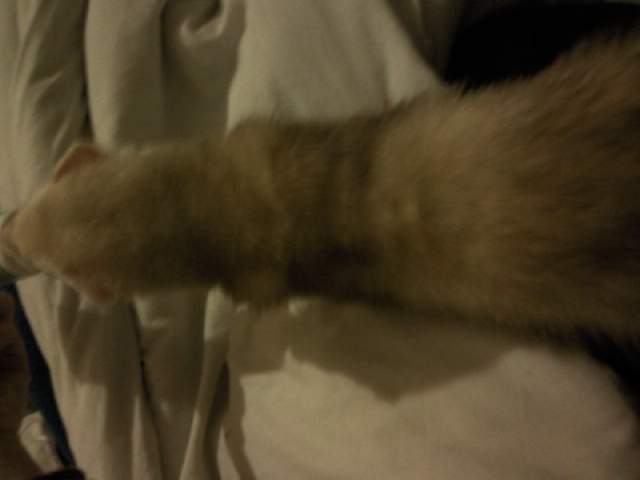 Fat boy with lumpy neck
QuestionOdins neck
QUESTION: Hi,
My 9 month old
Fat boy with lumpy neck
QuestionOdins neck
QUESTION: Hi,
My 9 month old
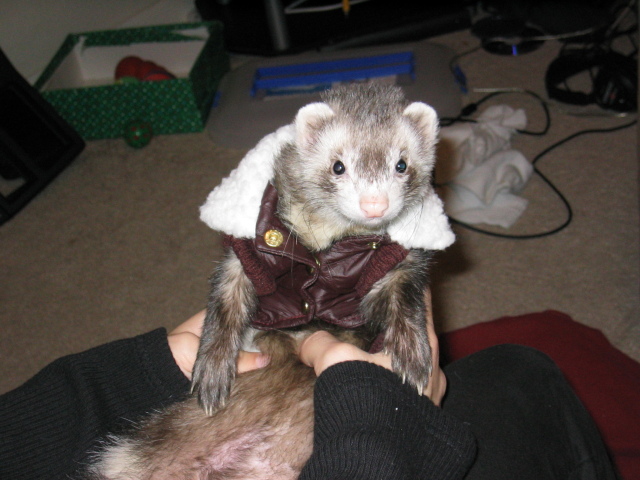 Eros
Question
Eros
Hello. My ferret, Eros, just turned
Eros
Question
Eros
Hello. My ferret, Eros, just turned
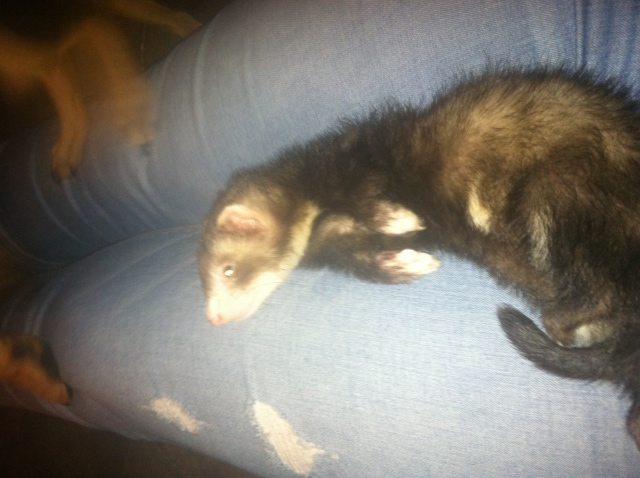 New ferret
Question
Franko the ferret
Hello,
I just boug
New ferret
Question
Franko the ferret
Hello,
I just boug
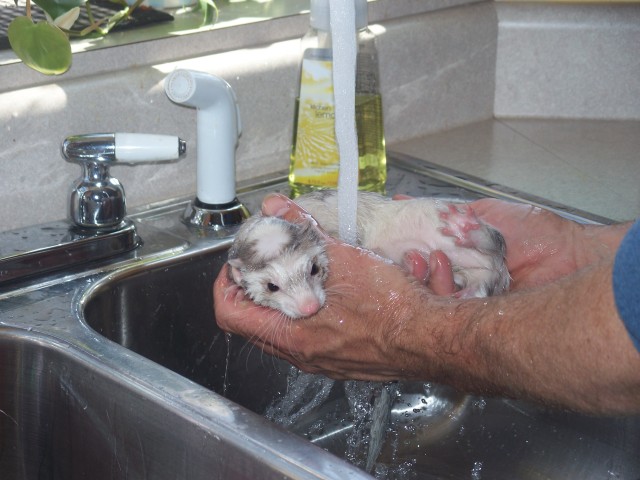 Concerns with Molly
Question
Molly when we firat go
Hello, I have a girl fe
Concerns with Molly
Question
Molly when we firat go
Hello, I have a girl fe
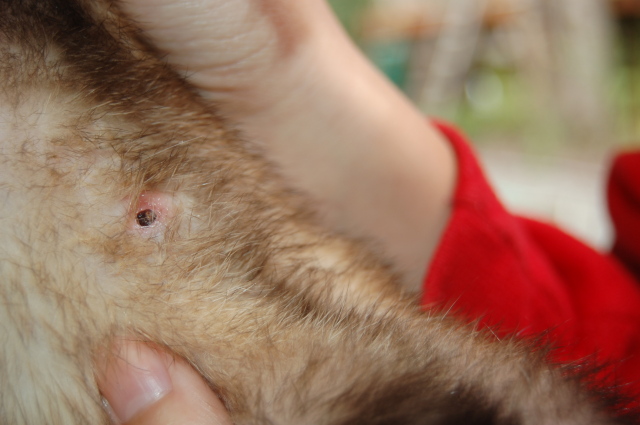 ferret sores
QuestionSore
QUESTION: My ferret skittles is alm
ferret sores
QuestionSore
QUESTION: My ferret skittles is alm